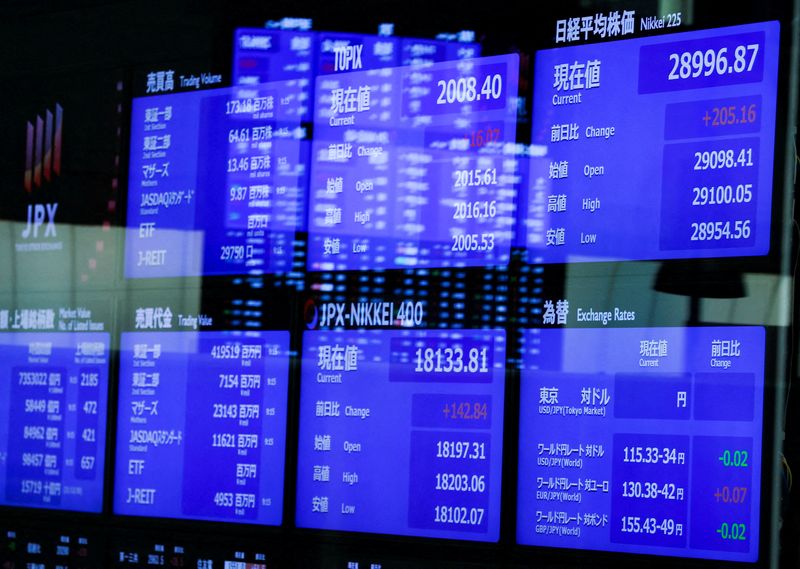By Chris Prentice and Nell Mackenzie
NEW YORK/LONDON (Reuters) - Global bank shares and short-dated U.S. Treasury yields plunged on Monday as concerns over fallout from the collapse of Silicon Valley Bank lingered despite action from regulators.
The U.S. dollar also fell. Gold and silver prices rallied on safe-haven buying. [GOL/]
Bond markets saw a repricing of rate hike bets, with rising expectations for a pause in rate hikes or a lower rate hike.
The Dow Jones Industrial Average fell 90.50 points, or 0.28%, to 31,819.14, the lost 5.83 points, or 0.15%, to 3,855.76 and the gained 49.96 points, or 0.45%, to 11,188.84.
The MSCI world equity index, which tracks shares in 49 nations, lost 0.39%.
European stocks logged their steepest one-day fall this year, with the pan-European STOXX 600 index closing down 2.3%.
Europe's bank index slumped nearly 6% after shedding 3.8% on Friday. HSBC's London listed dropped after it said it would acquire the UK subsidiary of stricken Silicon Valley Bank for the token amount of 1 pound ($1.21).
Shares of U.S. regional banks slumped, led by losses in First Republic Bank as news of fresh financing failed to assuage bank contagion fears.
Swiss financial regulator FINMA on Monday said it was seeking to identify any potential contagion risks for the country's banks and insurers.
Over the weekend, the Fed and U.S. Treasury announced measures to stabilise the banking system and said depositors at SVB would have access to their deposits on Monday.
The Fed also said it would make additional funding available through a new "Bank Term Funding Program", which would offer loans up to one year to depository institutions, backed by Treasuries and other assets these institutions hold.
"We are seeing a classic flight to safety," said Tom Caddick managing director at Nedgroup Investments. "Higher interest rates and a slowing economy was always going to bite."
U.S. authorities have also taken over New York-based Signature Bank, the second bank failure in a matter of days.
Analysts said it was crucial the Fed would accept collateral at par rather than marking to market, allowing banks to borrow funds without having to sell assets at a loss.
HEADACHE FOR THE FED
Traders no longer expect a rate hike of 50 basis points by the Federal Reserve next week and the current projection is for a 25-basis-point move, with some even expecting no hike at all, making gold, which does not yield interest, more attractive.
"A lot of these Fed members are doves at heart, and there is still a good amount of inflation pressure I expect in upcoming data points which will complicate the picture for the Fed," said Edward Moya, senior market analyst at data and analytics firm OANDA.
Moya pointed to February Consumer Price Index data, due on Tuesday, and Produce Price Index data, due on Wednesday.
GRAPHIC - Fedfunds
https://fingfx.thomsonreuters.com/gfx/mkt/xmvjknawlpr/Pasted%20image%201678705238121.png
Goldman Sachs (NYSE:GS) said in a note that its analysts no longer expect the Fed to deliver a rate hike at its next meeting on March 22. Others remained cautious.
The volatility in markets should become clearer once central banks, including the ECB, Fed and Bank of England set out their next steps, said James Rossiter, head of global macro strategy at TD Securities in London.
"Other non-affected banks may take a risk adverse approach to lending which may tighten financial conditions and do some of the Fed's work for them," he said adding that central banks before rate decisions go into a quiet period, unable to guide the markets on their next step.
Short-dated U.S. Treasury yields plunged, pushing their prices higher. The two-year note's yield fell below 4% for the first time since last October and was on track for its biggest one-day drop since October 1987 in the wake of Black Monday's stock market crash.[US/]
GRAPHIC - Biggest three-day fall in UST yields since 1987
https://fingfx.thomsonreuters.com/gfx/mkt/zjvqjyrmjpx/USyield1303.png
The European Central Bank, which meets on Thursday, is still widely expected to lift its rates by 50 basis points and to flag more tightening ahead, though it will now have to take financial stability into account.
The dollar index, a measure of the greenback against six other currencies, sliding 0.6%. The euro rose 0.8%.
Mexico's peso lost as much as 3.7% amid a selloff in Latin American currencies.
Gold climbed, with spot prices last up over 2.4% to their highest since early February. U.S. futures gained 2.6% to settle at $1,916.50.[GOL/]
Elsewhere in commodities, Brent crude futures settled down $2.01, or 2.4%, to $80.77. The global benchmark earlier fell to a session low of $78.34, its lowest price since early January.

U.S. West Texas Intermediate crude futures (WTI) CLc1 dropped $1.88, or 2.5%, to $74.80 a barrel after earlier hitting its lowest since December.
($1 = 0.8296 pounds)